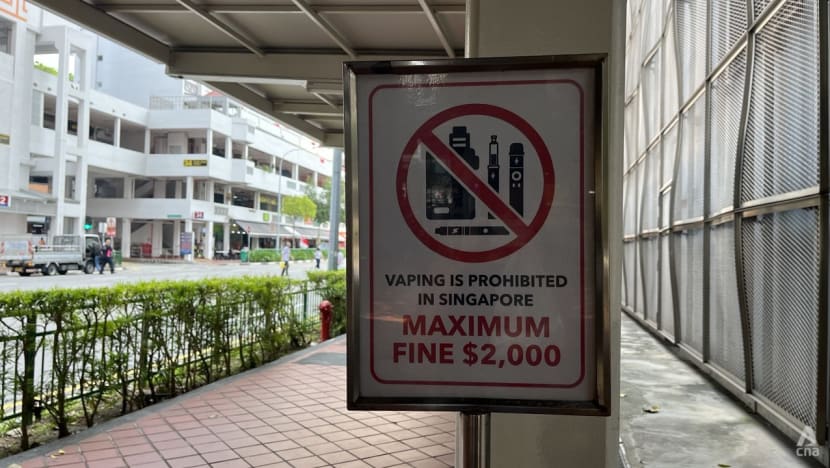Politics
Singapore Reassesses Vape Sentencing Guidelines Amid Enforcement Shift

Prosecutors from Singapore’s Health Sciences Authority (HSA) are revisiting sentencing submissions for all vape-related offences, extending beyond just those involving Kpods. This development was revealed in a district court hearing on August 25, 2024. Kpods are e-vaporisers that contain a mixture of vape juice and etomidate, an anaesthetic that will be classified as a Class C drug under the Misuse of Drugs Act starting in September.
During the hearing, HSA prosecutor Jolene Chia informed District Judge Wong Li Tein that the authority has been directed to re-evaluate sentencing submissions across the board for all vaping offences. This directive encompasses not only Kpod cases but also standard vape-related offences.
The case in focus involves Orison Toh Chun Kee, a 28-year-old facing four charges related to vaping, including possession of 1,639 vape sets in his vehicle in September 2024, which were intended for sale. Toh was scheduled to plead guilty in court, but Chia requested a four-week adjournment to accommodate the HSA’s reassessment of its sentencing approach.
Chia noted that Judge Wong Li Tein had previously postponed two guilty pleas on the same grounds, emphasizing the necessity of reviewing the overall sentencing strategy. Initially, the prosecution had indicated it would seek a one-week jail term and a fine for Toh. However, following the judge’s instructions, Chia communicated to Toh’s defence attorney that the prosecution may now pursue more severe penalties.
The discussion around updated sentencing comes in the wake of remarks made by Prime Minister Lawrence Wong during his National Day Rally speech on August 17. Wong stated that Singapore would begin to treat vaping as a drug issue, announcing intentions to strengthen enforcement measures. “So far, we’ve treated vaping like tobacco – at most, we impose a fine. But that’s no longer enough,” he said, indicating that the authorities would impose “much stiffer” penalties, potentially including incarceration.
Toh’s defence lawyer, Sameer Amir Melber from Gabriel Law Corporation, objected to the request for an adjournment, arguing that the case had been set for a guilty plea since July and had already been postponed once. “I think in light of the resident judge, District Judge Wong Li Tein, I have to adjourn this because there’s a relooking of the overall position and we want to ensure parity in sentencing,” said Judge Wong Peck, who presided over the hearing.
When asked if four weeks would be sufficient for the HSA to reassess its submissions, Chia expressed optimism, noting that this timeframe would serve as a “first cut.” The new date for Toh’s guilty plea is now set for September 25, 2024. Should he be found guilty of possessing vapes classified as imitation tobacco products for sale, Toh could face a sentence of up to six months in prison, a fine of up to S$10,000 (US$7,800), or both.
As the legal landscape surrounding vaping in Singapore evolves, this case may set important precedents for future enforcement and sentencing practices in the country.
-

 World5 months ago
World5 months agoSouth Korea’s Foreign Minister Cho Hyun to Visit China This Week
-

 Business5 months ago
Business5 months agoStarling Bank Plans Secondary Share Sale, Targeting $5.4 Billion Valuation
-

 Top Stories5 months ago
Top Stories5 months agoMunsang College Celebrates 100 Years with Grand Ceremony
-

 World5 months ago
World5 months agoPAS Aims to Expand Parliamentary Influence in Upcoming Election
-

 Business7 months ago
Business7 months agoKenvue Dismisses CEO Thibaut Mongon as Strategic Review Advances
-

 Lifestyle6 months ago
Lifestyle6 months agoHumanism Camp Engages 250 Youths in Summer Fest 2025
-

 Sports6 months ago
Sports6 months agoDe Minaur Triumphs at Washington Open After Thrilling Comeback
-

 Sports7 months ago
Sports7 months agoTupou and Daugunu Join First Nations Squad for Lions Clash
-

 Top Stories7 months ago
Top Stories7 months agoColombian Senator Miguel Uribe Shows Signs of Recovery After Attack
-

 World7 months ago
World7 months agoASEAN Gears Up for Historic Joint Meeting of Foreign and Economic Ministers
-

 Health6 months ago
Health6 months agoNew Study Challenges Assumptions About Aging and Inflammation
-

 Business7 months ago
Business7 months agoOil Prices Surge Following New EU Sanctions on Russia









